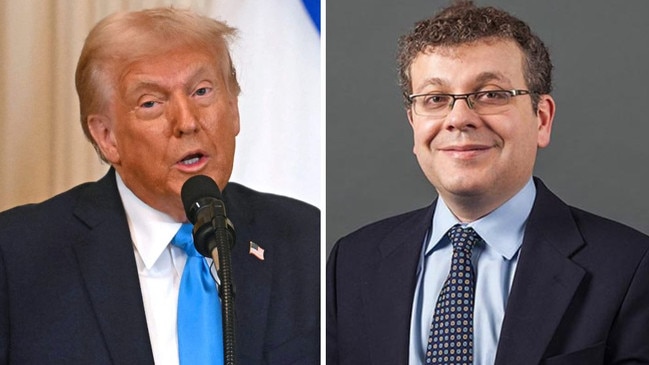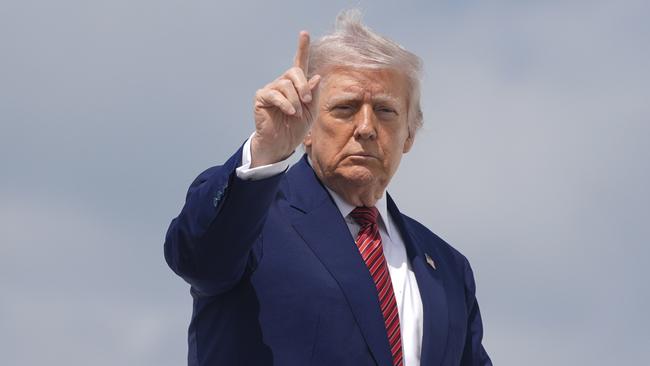‘Keep tariffs off for the sake of the world - and Australia’ says lawyer who led case against Trump’s levies
The lawyer who ran the successful case against Donald Trump’s sweeping levies describes them as a ‘massive, illegal power grab’.

The American lawyer who ran the successful case against Donald Trump’s tariffs says he wants to “keep them off for our sake, obviously, but also for the sake of the world – including Australia.”
Ilya Somin, a law professor at George Mason University, said the court’s unanimous decision in the case brought by the Liberty Justice Centre and himself on behalf of five US businesses impacted by the tariffs had exposed the US President’s “signature economic policy” as a “massive, illegal power grab”.
The decision on Wednesday (Thursday AEST) from the Court of International Trade blocked one of the Trump administration’s most audacious uses of executive power, under the International Emergency Economic Powers Act (IEEPA) of 1977.
In addition to blocking the April 2 “Liberation Day” tariffs, Mr Somin said the Court of International Trade had also found against the fentanyl-related tariffs that were imposed on China, Canada and Mexico.

Mr Somin told The Australian Mr Trump’s sweeping tariffs were “massively harmful to the US and the world economy” and he was “glad that the court refuted it in no uncertain terms”.
Mr Somin was hopeful the decision of the Court of International Trade would remain in place for the duration of any appeal – meaning the ruling could be the death knell for Mr Trump’s tariffs. “I’m guardedly optimistic because we just won a unanimous decision from judges appointed by three different presidents, including one appointed by Trump,” he said. “And that bodes well for us, I think, in any appeal.”
The comments came as Australian Trade Minister Don Farrell said he would aim to meet US trade representative Jamieson Greer next week in Paris to discuss a further exemption from the US tariffs. He also hoped to meet his Chinese counterpart, Wang Wentao.
On Thursday, Senator Farrell met 36 Australian steel and aluminium representatives to discuss the implications of US tariffs, the landmark decision of the US Court of International Trade and the Trump administration’s resolution to launch an appeal.
He strongly welcomed the court’s decision. Senator Farrell told The Australian that: “Whatever the case may be with these court decisions, we will continue to support any progress towards free and fair trade.
“We will continue to prosecute our argument with the Americans for the removal of the tariffs. If this decision assists that, well that’s very good news. I’m hoping to meet with Jamieson Greer next week in Paris where we will continue to argue for the removal of tariffs on Australian products and for a resumption of tariff free trade between Australia and the United States.
“I think the people are still absorbing this court decision. I think it’s too early to tell the implications. Regardless of the court cases we continue to prosecute our view that the tariffs are not justified and come at a great cost to both economies.”
The Chinese government was restrained in its initial response to the US federal trade court’s decision. China’s ambassador to the US, Xie Feng, said Beijing did not want a tariff war. “We think it will be a zero-sum game. No one will become the winner,” Mr Xie told the South China Morning Post.
Mr Xie said China was firmly against tariffs, but added: “Of course when it’s forced upon us then there’s simply no other choice but to respond.”
While the US federal court has forced Washington to immediately lift its 30 per cent tariffs on China, Beijing on Thursday gave no indication it would waive its 10 per cent tariff on American goods.
Chinese share markets rose on the news on Thursday, with Hong Kong’s Hang Seng index up 1.2 per cent and the Shanghai Stock Exchange Composite up 0.7 per cent.
The decision from the Court of International Trade stated the US Constitution assigned to the congress, the “exclusive powers to ‘lay and collect taxes, duties, imposts and excises’, and to ‘regulate commerce with foreign Nations’.”
It said the question in the two cases before the court was whether the International Emergency Economic Powers Act of 1977 delegated these powers to the president “in the form of authority to impose unlimited tariffs on goods from nearly every country in the world”.
“The court does not read IEEPA to confer such unbounded authority and sets aside the challenged tariffs imposed thereunder,” it said.
The decision deals a massive body blow to Mr Trump’s economic and trade agenda, including the baseline 10 per cent tariff that has captured Australia.
Mr Somin served as co-counsel for New York-based wine importer V.O.S. Selections and four other small businesses that were the plaintiffs in one of the cases before the Court of International Trade. He said the court ruling also covered a “closely related case” filed by 12 states – led by Oregon – and would “eliminate this entire system of IEEPA Liberation Day tariffs that Trump has tried to impose”.
This second case, which also included the state of New York, challenged the tariffs that Mr Trump said he imposed on Canada and Mexico to stop illicit drugs and illegal immigrants from coming into the US.
Mr Somin warned that the legal battle with the Trump administration was far from over, noting that there were other statutes that authorised the President to impose tariffs in a more limited way. “Obviously, Trump could try to make use of some of them,” Mr Somin said. “And, if he does, we’d have to see exactly what he does and which statue he uses and so forth.”
He said the three judges on the Court of International Trade were appointed by Mr Trump, Ronald Reagan and Barack Obama. Mr Somin said they had rejected the US government’s claim that Mr Trump had the unreviewable authority to determine whether there was a “national emergency” justifying the invocation of the IEEPA.
Senator Farrell said he had not yet received any advice on whether the 10 per cent baseline tariff on Australia would come off immediately.
“We’ve only heard this an hour ago,” he said. “Ambassador (Kevin) Rudd is on the job to find out exactly what the consequences are for Australia as a result of this decision.”
Additional reporting: Will Glasgow





To join the conversation, please log in. Don't have an account? Register
Join the conversation, you are commenting as Logout